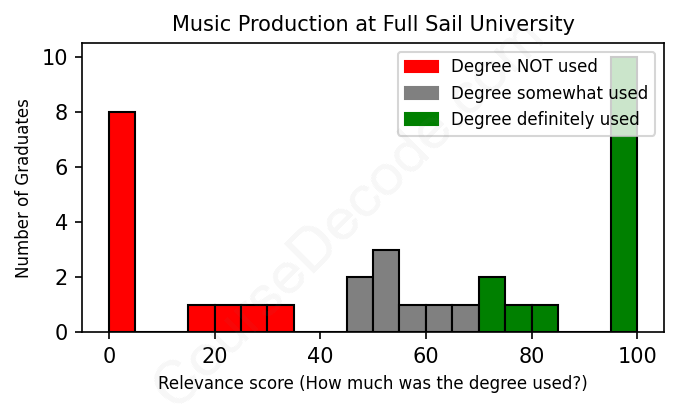
First, some facts. Of the Music Production graduates from Full Sail University we've analyzed , here's how many have used (or NOT used) their degree in their career:

These are estimates based on AI analysis of 34 LinkedIn profiles (see below).
The verdict? Significantly below average. Overall, with an average relevance score of 53%, Music Production graduates from Full Sail University have a much lower likelihood (-14%) of finding work in this field compared to the average graduate across all fields:
And for comparison, here's the chart for all profiles we've looked at across all degrees.
Also, after graduating, only 26% of these graduates have pursued further education other than another Bachelor's degree (such as a Masters degree or other), compared to the average across all profiles of 35%. This suggests a Bachelors degree is enough for most Music Production graduates, and it's normal to look for work straight after graduation.
See the details:
|
Relevance score: 0% We think this person has NOT gone into a career related to their degree. We think this person has NOT gone into a career related to their degree.
DEGREE INFOGraduated in 2017 from Full Sail University with a Bachelor of Science (BS) in Music Production. Also pursued further education since (see below). JOB HISTORY SINCE GRADUATIONResearcher Non-Disclosure Agreement Jul 2019 - Present FURTHER DEGREES DONE SINCE GRADUATINGCertificationFull Sail University 2019 - 2019 ABOUTI'm an Atlanta based composer, musician, songwriter, producer and mix engineer. I am currently pursuing projects for film/tv and multimedia. Music is my passion and has been a life long pursuit. I love to create, learn, problem solve, and I thrive under pressure. I specialize in orchestral, electronic, ambient and rock compositions. |
The top 10 most common jobs done by the graduates we've analyzed (ranked most common to least) are:
Here is a visual representation of the most common words in job titles for Music Production graduates (this is across all Music Production graduates we've analyzed, not just those who went to Full Sail University):

When looking at the career paths of graduates from Full Sail University's Music Production program, it's a mixed bag of experiences. Many of the early jobs after graduation tend to be quite disconnected from the music industry, with roles like line cooks, convenience store clerks, and even HR managers showing up frequently. It's clear that for many, the first job isn't exactly in the dream field they envisioned—some go through positions that seem to have little relevance to music production, which might be a bit disheartening.
Fast forward five to ten years, however, and there’s a more diverse range of experiences. Some graduates have carved out successful careers in music-related fields, like becoming music producers, audio engineers, and DJs. Others have launched their own production companies or found roles in areas like sound design and composing. Yet, there are still quite a few who ended up in various unrelated fields, showing that the journey isn't the same for everyone. While it’s great to see some people thriving in music, it’s equally evident that not everyone managed to stay within the industry. So, if you're considering this path, be prepared for a mix of both worlds—success in music is possible, but it may require some hustle and flexibility along the way.
Honestly, pursuing a Bachelor’s degree in Music Production at Full Sail University can be pretty intense, but it really depends on your passion for music and how well you handle a fast-paced learning environment. You’ll dive into a lot of technical stuff, like audio engineering, music theory, and software, which can be challenging if you’re not already familiar with it. The hands-on projects and studio work can feel like a lot of pressure at times, but if you're excited about it, that can make it more enjoyable. Overall, it might be slightly tougher than some other degrees because you're mastering both art and technology, but if you're dedicated and love what you're doing, it can be a rewarding experience. Just be ready to put in the work!
Most commonly, in the LinkedIn profiles we've looked at, it takes people 3 years to finish a Bachelor degree in Music Production.
From what I can see, it looks like many graduates from Full Sail University are still figuring things out financially, which is pretty common in the music and entertainment industry. Some, like the grads who have taken on roles as owners or artists, might be doing okay, especially if they’re hustling with multiple gigs. But a lot of the others have jobs that aren’t exactly high-paying, like working in restaurants or retail. While some have landed more stable positions, especially in customer service or production roles, it's a mixed bag overall. It seems like quite a few are still on the grind to build their careers and income, which can definitely take time in these fields!
Here is a visual representation of the most common words seen in the "about" section of LinkedIn profiles who have a Bachelor degree in Music Production (this is across all Music Production graduates we've analyzed, not just those who went to Full Sail University). This may or may not be useful:

Here are all colleges offering a Bachelor degree in Music Production (ordered by the average relevance score of their Music Production graduates, best to worst) where we have analyzed at least 10 of their graduates:
| College | Score | Count |
|---|---|---|
 Full Sail University Full Sail University
|
53 | 34 |